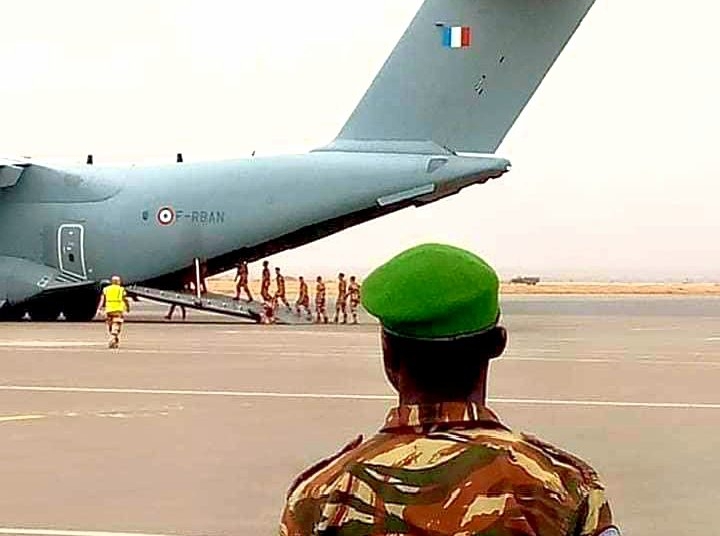French military forces have begun their withdrawal from Niger, with the first group of troops departing for France under the protection of the Nigerien Armed Forces.
French soldiers left their bases in Niger on Tuesday in a ground convoy under local escort, “heading for Chad”, said the military regime in power in Niamey since the end of July.
This operation aims to bring all French soldiers back to France by the end of 2023. The withdrawal follows last month’s announcement by French President Emmanuel Macron that France would recall its ambassador and end all military cooperation with Niger in response to a coup.
“Troops based in Ouallam (west) left their base today. These are operations for the departure of the first land convoy bound for Chad under escort from our Defense and Security Forces”, said the Niamey regime, in a statement read out Tuesday evening on national television.
In addition to this departure by land, “three special flights” were registered at Niamey airport, two for the departure of “97 elements of the special forces” and one “dedicated to logistics”.
The regime wants this withdrawal to take place “in complete safety”, specifies that the disengagement will continue in accordance with “the timetable agreed by both parties”.
The departure of French troops from Niger has significant implications for counter-terrorism operations in the Sahel region and underscores the French government’s stance on the coup. President Macron stated that France would not allow itself to be held hostage by the coup leaders and made it clear that military cooperation between the two nations was over. As a result, French troops are expected to leave in the coming months.
Niger had been a key security partner for both France and the United States, who used the country as a base to combat Islamist insurgents in the wider Sahel region of West and Central Africa. The departure of French forces represents a significant shift in the security landscape of the region.
French military involvement in the Sahel region had been part of Operation Barkhane, which aimed to counter Islamist extremist groups. However, the coup in Niger and the resulting diplomatic tensions have led to the end of this mission. The impact of the withdrawal on security efforts in the Sahel is substantial.
Some 1,400 French soldiers and airmen were deployed in the country to fight jihadists alongside European Union forces, and the Nigeriens, including around 1,000 in Niamey and 400 at two forward bases in the west, at Ouallam and Tabarey-Barey, in the heart of the so-called “three borders” zone with Mali and Burkina Faso.
This development comes in the context of growing anti-French sentiment in West Africa, with many local politicians accusing France of pursuing neocolonialist policies. The coup in Niger has exacerbated these sentiments, and there are also concerns about the increasing involvement of Russia’s Wagner mercenary group in the Sahel.
The regional Economic Community of West African States (ECOWAS), with the support of France, had threatened military intervention in Niger to restore the pre-coup administration. However, as of now, no such intervention has occurred.
The impact of France’s withdrawal from Niger also extends to its military assets. French forces will need to find a new mission for their GBU-12 Paveway-armed MQ-9 Reaper drones, which had played a significant role in Operation Barkhane and were based in Niger. These drones will now require a new operational context.
The United States, in contrast, has signaled its commitment to continue counterterrorism operations in Niger by resuming drone missions. This demonstrates a willingness to collaborate with the new military junta in Niger. It is important to watch how the evolving political situation in Niger will influence international counterterrorism efforts in the Sahel.
Although, US State Department spokesperson Matthew Miller said that some $200m in foreign assistance temporarily paused to Niger in August had now been officially suspended.
“Any resumption of US assistance will require action… to usher in democratic governance in a quick and credible timeframe,” Miller said in a statement.
While France’s decision to withdraw its forces is a significant development in the region, it remains to be seen how the security landscape will evolve and how other nations may adjust their strategies in response to these changes. The impact of this withdrawal on regional security and counterterrorism operations is a subject of critical concern.





